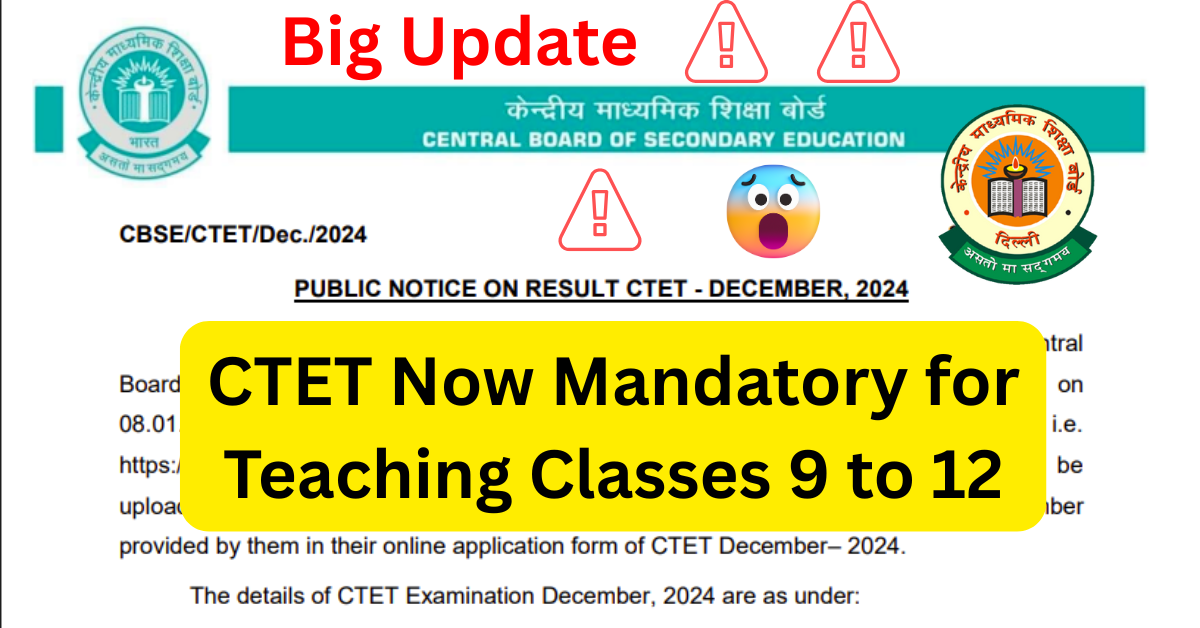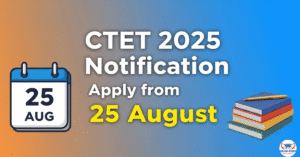CTET Now Mandatory for Teaching Classes 9 to 12: A major update has been announced for candidates preparing to become teachers. The Central Board of Secondary Education (CBSE) has released new guidelines regarding the Central Teacher Eligibility Test (CTET). Now, passing CTET has been made mandatory for teaching classes 9 to 12 in addition to existing levels. Until now, CTET was conducted only for teachers of classes 1 to 5 (Paper 1) and 6 to 8 (Paper 2). But now, it will also apply to higher classes (9 to 12).
CTET Now Mandatory for Teaching Classes 9 to 12: What’s the New Change?
According to the updated guidelines issued by the Ministry of Education and CBSE:
- CTET will now be compulsory for candidates aspiring to teach classes 9 to 12.
- Candidates must have a Postgraduate degree, a B.Ed, and must qualify CTET.
- Previously, CTET was applicable only for Primary (1–5) and Upper Primary (6–8) levels.
CTET Required Levels and Eligibility
| Level | Minimum Required Qualification |
|---|---|
| Class 1–5 | D.El.Ed or BTC + CTET (Paper 1) |
| Class 6–8 | Graduation + B.Ed + CTET (Paper 2) |
| Class 9–12 | Post Graduation + B.Ed + CTET (New Rule) |
Teacher Selection Process Becomes Stricter
With this decision, the selection process for teachers of classes 9 to 12 will now be more rigorous:
- The candidate must pass CTET
- The candidate must have a Postgraduate degree in the relevant subject
- B.Ed qualification is also compulsory
This change aligns with the National Education Policy (NEP) 2020, which emphasizes improving the quality of teacher recruitment across the country.
CTET Will Also Be Required for Pre-Primary (Balvatika)
CBSE has also clarified that pre-primary (Balvatika) teachers will now be required to pass a separate eligibility test.
Previously, CTET was required only for teaching class 1 and above. But now, separate guidelines and exam patterns will be introduced for Balvatika-level teachers as well.
What Officials Are Saying?
Senior official from the Education Ministry, Jebe Yadav, said:
“CTET will now also apply to teachers of classes 9 to 12. This will help improve the quality of teacher selection. States have been instructed to update their rules accordingly.”
Why is CTET Being Made Compulsory?
- To improve the quality of education
- To establish a uniform eligibility standard across India
- To ensure only qualified and trained teachers are hired
- To provide better educators to students
- To implement the goals of the NEP 2020
Eligibility to Appear for CTET
- Graduation or Post Graduation from a recognized university
- B.Ed or D.El.Ed (recognized teacher training qualifications)
- Minimum 50% marks (relaxation for reserved categories)
- Must meet the age criteria set by CBSE

What is CTET?
CTET (Central Teacher Eligibility Test) is a national-level eligibility exam conducted by CBSE twice a year. The exam has two papers:
- Paper 1: For teaching Classes 1 to 5
- Paper 2: For teaching Classes 6 to 8
- In the near future, a Paper 3 (or an updated version of Paper 2) may be introduced for Classes 9 to 12
What to Expect in CTET 2025?
- A new section may be added in CTET
- A revised syllabus for higher secondary (9–12) teachers
- Questions from postgraduate-level subjects may be included
- New preparation guidelines to be issued for candidates
Important Links
| Link Name | Website URL |
|---|---|
| Official Website | ctet.nic.in |
| Our Website | delednews.in |


